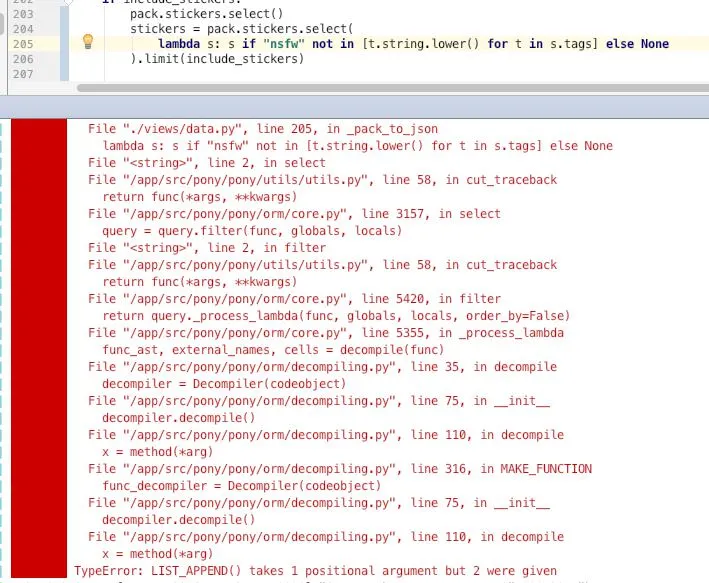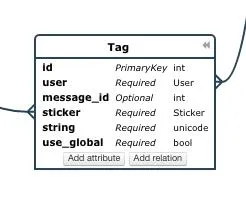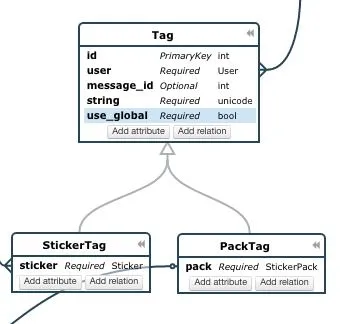
 Lucky
Lucky
(How) can I order elements in a Set?
pack = StickerPack.get(url=shortname)
sticker_list = pack.stickers
Now pack.stickers.order_by(Sticker.file_id)?
Probably like this?
stickers_list = orm.select(s for s in Sticker if s.sticker_pack and s.sticker_pack.url == shortname).order_by(Sticker.file_id)
 Alexey
Alexey
You can have even more complex ordering condition using lambdas https://docs.ponyorm.com/api_reference.html#Set.order_by
 Lucky
Lucky
Summary:
isinstance(pack, StickerPack)
and
orm.select(s for s in pack.stickers)
results in
TypeError: Cannot iterate over non-entity object
 Lucky
Lucky
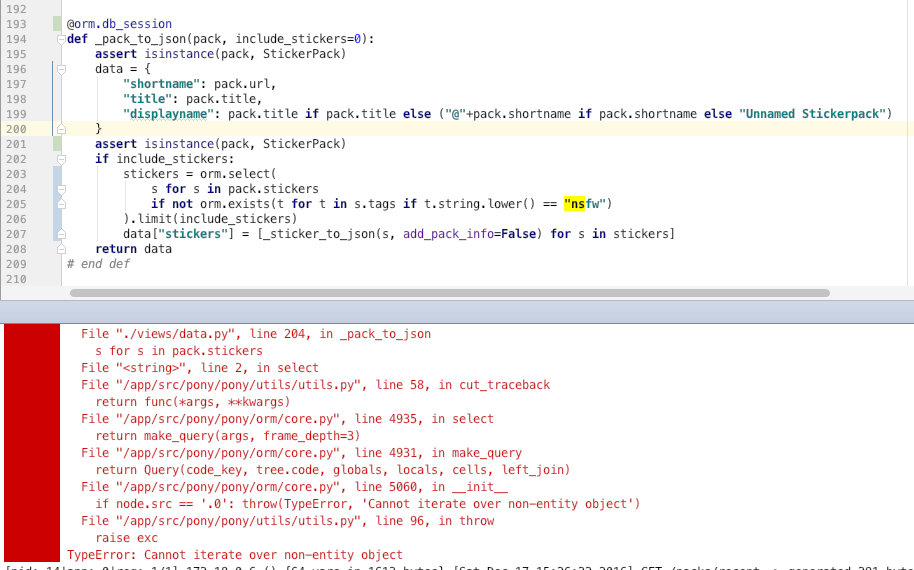
 Lucky
Lucky
I think I can do that on python side, with:
data["stickers"] = [_sticker_to_json(s, add_pack_info=False) for s in [s_ for s_ in pack.stickers if not "nsfw" in [t.string.lower() for t in s_.tags]][:include_stickers]]
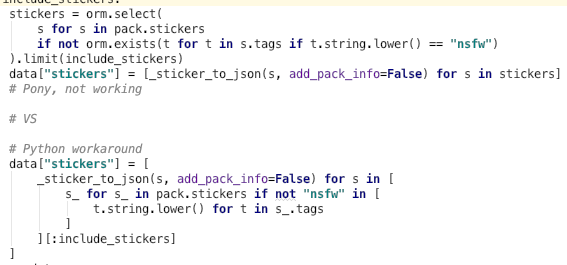
 Lucky
Lucky
What is the best way to do it?
Doing it in-memory on python side is not what I really want to do...
 Lucky
Lucky
In any case, here my relevant data stucture, but it didn't change much.
class Sticker(db.Entity):
file_id = Required(str) # BQADBAAD6QIAAqQW9AX8GaFqUwWnrgI
emoji = Required(unicode) # ❓
sticker_pack = Optional('StickerPack', column='sticker_pack_url')
tags = Set('Tag', cascade_delete=True)
sticker_messages = Set('StickerMessage')
tl_id = Optional(int, size=8) # The id field of the telegram api schema the apps use.
tl_access_hash = Optional(int, size=8) # The access_hash field of the telegram api schema the apps use.
PrimaryKey(file_id, emoji)
class Tag(db.Entity):
id = PrimaryKey(int, auto=True)
user = Required(User, column='user_id')
message_id = Optional(int) # Of the message with the text, the tag. None means it got added via web gui.
sticker = Required(Sticker)
string = Required(unicode)
use_global = Required(bool, default=False)
composite_key(user, sticker, string)
class StickerPack(db.Entity):
url = PrimaryKey(str)
title = Required(str)
owner = Required(User, column='owner_id')
stickers = Set(Sticker)
first_seen = Required(datetime, sql_default='NOW()')
 Alexander
Alexander
At this moment there is a technical limitation, that only entity class can be used as a source of generator. We can overcome it, but other tasks were more important. If you want to select from a collection you need to use lambda syntax:
result = pack.stickers.select(
lambda s: ...)
 Lucky
Lucky
I'll try that, and hope this will be added eventually. But indeed this is not the most urgent feature to have :D
 Alexander
Alexander
lambda should return true for objects you want to select. like:
student1.courses.select(lambda c: c.credits > 20 and "philosophy" in c.name.lower())
 Lucky
Lucky
But it seems lambda s: "nsfw" not in [t.string.lower() for t in s.tags] is not possible?
Still failing with
TypeError: LIST_APPEND() takes 1 positional argument but 2 were given
 Alexander
Alexander
Apparently, we need to fix bytecode decompiling for [...] in last Python. They both should work. The fix should be pretty easy
 Anonymous
Anonymous
Hi, I'm using pony and I want to return list of results from a function with the @db_session decorator. the results are the relations from one of my classes. however when I try to access the properties of those results outside the function I get pony.orm.core.DatabaseSessionIsOver: Cannot load attribute Ramal[2].ramal: the database session is over . How can I query all properties from those objects and return them to use them later?
 Anonymous
Anonymous
I was trying to modularize and save the results obtained in the search to be used in other functions.
 Anonymous
Anonymous
glad to hear that, would it be a good idea to also add a way to copy the result to a python dictionary to be used outside the db_session?
 Lucky
Lucky
 Alexander
Alexander
Currently you can use to_dict method of entity instance. You can get a query result and convert it to list of dicts using a list comprehension.
 Lucky
Lucky
 Lucky
Lucky
The limitation of to_dict is may be hard to convert deep nested structures
How does it handle timestamps?
 Alexander
Alexander
It should return attribute values as a dict values. It does not convert them to JSON-compatible values automatically. But when you call json.dumps you can pass default argument which is a function. You can pass a function which convert a timestamp to suitable representation
 Alexander
Alexander
It is in process, we have some tests which a fail currently and want to fix them before release
 Lucky
Lucky
The difference is that I moved sticker into a subclass, and added anotherone with a stickerpack attribute
 Lucky
Lucky
The difference is that I moved sticker into a subclass, and added anotherone with a stickerpack attribute
What I understood, Pony does that in one big table, distinguising it with a special row, telling it to be a specific class.
 Alexey
Alexey
def account_page():
user = get_current_user()
projects = Project.select(lambda p: p.user == user).order_by(desc(Project.updated_at))
account = user.to_dict(exclude=['id', 'password', 'balance'])
return json.dumps({
'account': account,
'projects': [dict(p.to_dict(exclude=['id', 'user', 'data'])) for p in projects]
}, default=json_handler)
 Alexey
Alexey
def json_handler(obj):
if hasattr(obj, 'isoformat'):
return obj.isoformat()
elif isinstance(obj, UUID):
return str(obj)
else:
raise TypeError("Unserializable object {} of type {}".format(obj, type(obj)))
 Lucky
Lucky
What I understood, Pony does that in one big table, distinguising it with a special row, telling it to be a specific class.
So, I'd need to add a row for that?
If I remember correctly thats type "text" and contains a string of the class name? In that migration I would need to fill in "StickerTag", right? (I still have the sticker attribute)
And add another pack field?
 Alexander
Alexander
I think that first version of migration tool will not support such a changes which move attributes between subclasses. But this migration is actually simple. The first change is adding classtype system column which Pony uses to distinguish between subclasses. The second one is adding pack column for PackTag.pack relation. So the SQL for migration looks like (I assume PostgreSQL is used):
alter table "tag" add column "classtype" text;
update "tag" set "classtype" = "StickerTag"; --for previous objects
alter table "tag" add column "pack" int references "stickerpack" ("id");
 Lucky
Lucky
 Lucky
Lucky
I think that first version of migration tool will not support such a changes which move attributes between subclasses. But this migration is actually simple. The first change is adding classtype system column which Pony uses to distinguish between subclasses. The second one is adding pack column for PackTag.pack relation. So the SQL for migration looks like (I assume PostgreSQL is used):
alter table "tag" add column "classtype" text;
update "tag" set "classtype" = "StickerTag"; --for previous objects
alter table "tag" add column "pack" int references "stickerpack" ("id");
If I still have an old version of that code which needs to run, can I change it anyway?
Probably should default the classtype to "StickerTag", can that work?
 Lucky
Lucky
Cool, because I have seperated everything between Dev and Production,
well except the database :/
The DB is shared.
 Alexander
Alexander
That way you may be sure that you non-tested dev code does not delete all objects from the database
 Lucky
Lucky
Yes, definitly.
Probably I'll learn that as soon as I fry up the DB.
Couldn't find a way to easily export/import all the data, so I instead make periodically backups of the postgres folder... ... .. . and hope nothing bad happens...
(Yeah that is terrible, I know)
 Alexander
Alexander
I think making backup of entire database is outside of Pony scope. But maybe we should have a method to save content of a known entities into a big JSON file and then to load data from that file
 Lucky
Lucky
I think making backup of entire database is outside of Pony scope. But maybe we should have a method to save content of a known entities into a big JSON file and then to load data from that file
You could still "abuse" that,
to have something similar to a backup, yes


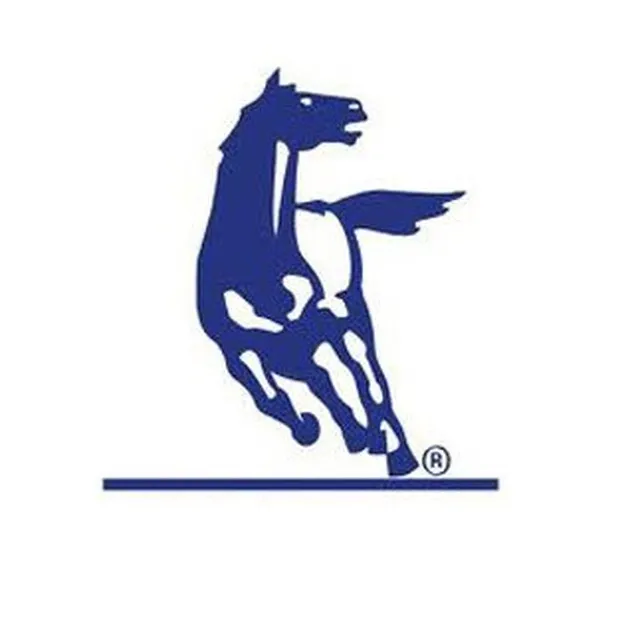 Andrew
Andrew
